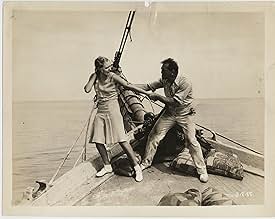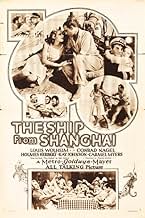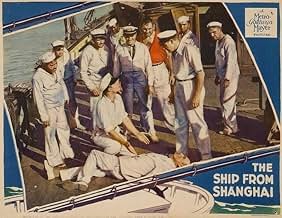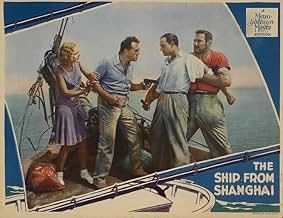Füge eine Handlung in deiner Sprache hinzuOn a yacht sailing from Shanghai to the United States, the sailors, led by the megalomaniac steward, revolt and take control.On a yacht sailing from Shanghai to the United States, the sailors, led by the megalomaniac steward, revolt and take control.On a yacht sailing from Shanghai to the United States, the sailors, led by the megalomaniac steward, revolt and take control.
Henry Armetta
- Sailor
- (Nicht genannt)
Willie Fung
- Shanghai Nightclub Patron
- (Nicht genannt)
Pietro Gentile
- Minor Role
- (Nicht genannt)
Pat Harmon
- Sailor
- (Nicht genannt)
Albert MacQuarrie
- Sailor
- (Nicht genannt)
Pat Moriarity
- Sailor
- (Nicht genannt)
Kane Richmond
- Shanghai Nightclub Patron
- (Nicht genannt)
Floyd Shackelford
- Sailor
- (Nicht genannt)
Otto Yamaoka
- Shanghai Nightclub Patron
- (Nicht genannt)
Empfohlene Bewertungen
Yes, this early talkie is not the smoothest production to watch. And some of the acting could have been more subtle. But I found it interesting to watch--mostly because it represents an historic era in filmmaking.
The story is about a small group of idle rich who decide to sail a yacht across the Pacific. During the trip, they are ignorant of the crew's dissatisfaction with the way they are treated. The steward, Ted, especially is resentful of his lot in life. He privately vents his anger over having to wait hand and foot for people who, he feels, are no better than he.
Due to uncontrollable circumstances, the situation changes. Class distinctions break down and Ted makes a power play, motivated by revenge and his perception of "justice".
Variations of this story have been filmed numerous times since, which makes me wonder if some of them originated from this film. There are definite similarities between this film and "Swept Away", which I heartily recommend--the original directed by Lina Wertmuller.
The story is about a small group of idle rich who decide to sail a yacht across the Pacific. During the trip, they are ignorant of the crew's dissatisfaction with the way they are treated. The steward, Ted, especially is resentful of his lot in life. He privately vents his anger over having to wait hand and foot for people who, he feels, are no better than he.
Due to uncontrollable circumstances, the situation changes. Class distinctions break down and Ted makes a power play, motivated by revenge and his perception of "justice".
Variations of this story have been filmed numerous times since, which makes me wonder if some of them originated from this film. There are definite similarities between this film and "Swept Away", which I heartily recommend--the original directed by Lina Wertmuller.
1930 was the year that MGM went to all-talkie production and this movie demonstrates their lack of ease with the new medium. In addition they saddled themselves with a lot of sequences shot on the water, always a risky proposition -- although the ship was likely at the docks.
Meanwhile this production is afflicted with all the stereotypical problems of early sound productions: a static camera, unnatural-sounding sound with a lot of hiss and badly directed dialogue. Even if you discount these problems, this story of how brutish purser Louis Wollheim seizes control of a yacht after it is wrecked in the storm lacks interesting characters. Each character can be defined in a sentence. The interesting parts of the movie are the sailors trying to deal with the storm as it swamps the yacht; and Kay Johnson checking on the badly injured Conrad Nagel. Those, however, are clearly shot MOS. The rest of the movie makes use of cuts where a moving camera would have been better.
MGM clearly figured this movie to be a greater success than it turned out and its failure pretty much ended the career of Kay Johnson and knocked Conrad Nagel out of the leading man category. Louis Wollheim survived and prospered off his next movie, the great ALL QUIET ON THE WESTERN FRONT. If the MGM brass thought this movie would propel them firmly into the sound era, they were sadly mistaken.
Meanwhile this production is afflicted with all the stereotypical problems of early sound productions: a static camera, unnatural-sounding sound with a lot of hiss and badly directed dialogue. Even if you discount these problems, this story of how brutish purser Louis Wollheim seizes control of a yacht after it is wrecked in the storm lacks interesting characters. Each character can be defined in a sentence. The interesting parts of the movie are the sailors trying to deal with the storm as it swamps the yacht; and Kay Johnson checking on the badly injured Conrad Nagel. Those, however, are clearly shot MOS. The rest of the movie makes use of cuts where a moving camera would have been better.
MGM clearly figured this movie to be a greater success than it turned out and its failure pretty much ended the career of Kay Johnson and knocked Conrad Nagel out of the leading man category. Louis Wollheim survived and prospered off his next movie, the great ALL QUIET ON THE WESTERN FRONT. If the MGM brass thought this movie would propel them firmly into the sound era, they were sadly mistaken.
The Ship from Shanghai (1930)
** (out of 4)
Squeaky, early talkie from MGM has a bunch of rich, spoiled people (including Conrad Nagel and Kay Johnson) out on a yacht when the crew, led by Louis Wolheim, decide to overtake it and have some fun on their own. THE SHIP FROM SHAGHAI has three familiar faces but sadly the end result is pretty lame and it's "C" level production makes you feel as if you're watching a poverty row studio instead of someone like MGM. What's interesting about this film is that it seems to have a message to get across but sadly the characters are just so deadly dull that it never really happens. I'm sure there's a message saying that the rich shouldn't be snobs and I'm sure the writers enjoyed having these poor crew members seek revenge but to me there was just a bunch of stereotypes and very little else. There's a romance involving Nagel and Johnson that never goes anywhere and the amount of screen time devoted to it is just weak. There are a lot of scenes with Wolheim sounding off about a variety of issues but it adds up to nothing. In fact, I'm really not sure what's up with Wolheim's performance but it's certainly a strange one. At times he appears to be acting drunk while at other times he comes across mentally slow. I'm not sure what they were trying to do with his character but it never really worked. Fans of the stars might want to check this out just to see them in early roles but sadly the film really doesn't do much but thankfully it only lasts 67-minutes.
** (out of 4)
Squeaky, early talkie from MGM has a bunch of rich, spoiled people (including Conrad Nagel and Kay Johnson) out on a yacht when the crew, led by Louis Wolheim, decide to overtake it and have some fun on their own. THE SHIP FROM SHAGHAI has three familiar faces but sadly the end result is pretty lame and it's "C" level production makes you feel as if you're watching a poverty row studio instead of someone like MGM. What's interesting about this film is that it seems to have a message to get across but sadly the characters are just so deadly dull that it never really happens. I'm sure there's a message saying that the rich shouldn't be snobs and I'm sure the writers enjoyed having these poor crew members seek revenge but to me there was just a bunch of stereotypes and very little else. There's a romance involving Nagel and Johnson that never goes anywhere and the amount of screen time devoted to it is just weak. There are a lot of scenes with Wolheim sounding off about a variety of issues but it adds up to nothing. In fact, I'm really not sure what's up with Wolheim's performance but it's certainly a strange one. At times he appears to be acting drunk while at other times he comes across mentally slow. I'm not sure what they were trying to do with his character but it never really worked. Fans of the stars might want to check this out just to see them in early roles but sadly the film really doesn't do much but thankfully it only lasts 67-minutes.
That's the sound that this ancient maritime drama makes as it meanders through it's less than exciting hour long running time. Set on a transoceanic trip from Shanghai to San Francisco, the film stars Kay Johnson, Conrad Nagel, and Zeffie Tilbury as a group of incredibly annoying passengers who end up under the thumb of evil steward Louis Wolheim, who seems to be channeling the spirit of a very dumb and quite drunk Wallace Beery. There's some scratchy stock footage of Chinese villagers to help set the scene and a bizarre (and pointless) rendition of Singin' In the Rain performed by a band of Asian men in coolie hats. This badly recorded, crude early talkie will put most viewers to sleep.
Thuggish steward (Louis Wolheim) leads a mutiny aboard a yacht. The first half of the film makes us kind of hate the rich passengers on the yacht, particularly the insipid romance of Conrad Nagel and Kay Johnson. But after the mutiny the film seems to shift sympathies back to them and away from the highly entertaining power-hungry steward. The whole movie centers on Louis Wolheim's intense performance. Wolheim died the year after this was released. I was surprised to find out he was actually a math teacher at Cornell before his acting career. This is an OK movie considering the age. It creaks a little but not as badly as some claim. Amusingly, despite living under harsh conditions adrift at sea for days or weeks with very little water or food, neither Nagel nor Johnson ever have their hair mussed up.
Wusstest du schon
- Zitate
Howard Vazey: It isn't a jazz band; its a band of angels.
- Alternative VersionenMGM also released this picture as a silent film, but no details are known.
- SoundtracksSingin in the Rain
(1929) (uncredited)
Music by Nacio Herb Brown
Lyrics by Arthur Freed
Played by a band in a Shanghai nightclub as dance music and sung in a Chinese dialect by the band members
Sung also by Conrad Nagel in English as he danced with Kay Johnson
Reprised a cappella by Conrad Nagel aboard the yacht
Top-Auswahl
Melde dich zum Bewerten an und greife auf die Watchlist für personalisierte Empfehlungen zu.
Details
- Erscheinungsdatum
- Herkunftsland
- Sprache
- Auch bekannt als
- Sudbonosni brod
- Drehorte
- Produktionsfirma
- Weitere beteiligte Unternehmen bei IMDbPro anzeigen
- Laufzeit1 Stunde 7 Minuten
- Farbe
- Seitenverhältnis
- 1.20 : 1
Zu dieser Seite beitragen
Bearbeitung vorschlagen oder fehlenden Inhalt hinzufügen

Oberste Lücke
By what name was The Ship from Shanghai (1930) officially released in Canada in English?
Antwort

























